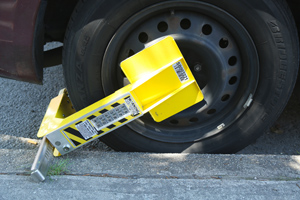Shopping center had no common-law right to boot vehicles, top state court says in car owner’s RICO suit

Image from Shutterstock.
A car owner who had to pay $650 to get an immobilizing boot removed from his tire will get a second crack at class action status in his racketeering lawsuit as a result of a ruling Tuesday by the Georgia Supreme Court.
In a Dec. 14 opinion, the court said a private shopping center lot in DeKalb County, Georgia, had no common-law right to apply boots to trespassing vehicles.
The state supreme court ruled for plaintiff Forrest Allen, who sued the owner and operator of the parking lot, as well as commercial tenants of the adjacent shopping center, including Dollar Tree stores.
Allen sought class action status for his suit alleging negligence, premises liability, false imprisonment, conversion and violation of the Georgia Racketeer Influenced and Corrupt Organizations Act.
The court rejected two theories advanced by the defendants.
The first rejected theory was that booting is allowed because of a landowner’s right at common law to remove with due care the property of others left on their land without permission.
The court said the act of immobilizing a trespassing vehicle is different than removing unauthorized property because immobilizing the vehicle perpetuates the trespass. In addition, Georgia’s towing statute has displaced, at least partly, the common-law rule, the court said.
The second rejected theory was that booting is allowed under the common-law doctrine of “distress damage feasant.” The theory recognizes a landowner’s right to impound trespassing livestock causing actual damage to property and to hold it as security until the animal owner compensates the landowner for damages.
The state supreme court said the doctrine has applied only to livestock. And if it did apply in this case, there must be proof of actual damage to property, which didn’t happen.
“Defendants have cited no authority from Georgia or any other jurisdiction where a court applied the distress damage feasant doctrine to anything other than livestock or where the court held that a landowner has a common-law right to impound and hold a chattel, such as an automobile, whose owner is easily discoverable,” the Georgia Supreme Court said.
“Indeed, there appears to be no legal authority recognizing a common-law right to immobilize unauthorized vehicles located on private property and hold them against the owner’s will until payment is received.”
The court returned the suit to the trial court for a new assessment of the plaintiff’s motion for class certification.
Hat tip to Courthouse News Service.
Write a letter to the editor, share a story tip or update, or report an error.


